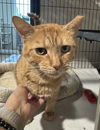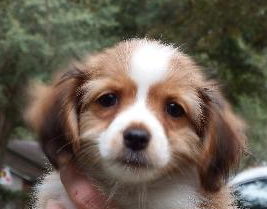
| My Rescue |
| Login to Remember your Favorite Animals and Breeds! |
Learn more about the Australian Terrier.
Ellie the ABC Puppy's brother, Dolan the ABC's Puppy (adopted) can also be seen on our website.
Ellie the ABC Puppy's mother, Aleaha the Cairn Terrier Blend Momma (adopted) can also be seen on our website.
Ellie the ABC Puppy's brother, Cooper the ABC's Puppy (adopted) can also be seen on our website.
Ellie the ABC Puppy's brother, Bentley Boo the ABC's Puppy (adopted) can also be seen on our website.
The ABC puppies and their mama came from another rescue.
This is a lively crew of puppies. They all come running when you clap or call them, and they love puppy treats. They all love running and horsing around in the grass, and if you clap and run away, they all follow, and it’s a little puppy parade in the front yard. Every one of them is very friendly and eager to be held, petted, and snuggled.
They live most of the time in a puppy pen, and they poo on the half of it where I put the newspapers. They will be easy to crate train, because they know to keep their bed and feeding area clean. They cry in the morning—but only when they see someone up and about. They don’t cry at night, but they do use their papers (poo and pee) a lot throughout the night. During the day they are mostly quiet, but will have a big ruckus of fighting and playing once in a while.
They eat a little canned food for breakfast, then free feed on dry food the rest of the day. I have not been able to get them to eat dry food mixed with anything.
According to www.dogbreedinfo.com, this dog, known since 1500, was first publicly presented in 1909 and became popular after 1930. The Cairn is one of Scotland's original Terriers, probably a contributor to today's Scottish, West Highland White and Skye Terrier breeds. Named for the piles of small stones used to mark Scottish farm borders and graves, the Cairn Terrier's job was to rout small animals from their lairs in these stone piles. Though used for such purposes for centuries, the Cairn Terrier is now primarily a companion dog. He also excels at Terrier (Go-To-Ground) trials. Everyone remembers a Cairn called "Toto" in the film "The Wizard of Oz." Some of the Cairn's talents are hunting, tracking, watchdogging, agility, competitive obedience, and performing tricks. The Cairn Terrier is a spirited, hardy, restless little busybody - a big dog in a small dog's body. Alert, loyal, merry, lovable and mischievous. They are somewhat independent, but friendly. Females tend to be more independent than males and some breeders feel that males are more affectionate. They are very curious, fearless and bold. They are easily trained and like to do tricks. Naturally patient with children and very playful. Cairns adapt well to their new homes. They are sensitive, and need firm, but not harsh, training and discipline. Without attention and training, the Cairn can become destructive and/or bark excessively. Cairns like to dig searching for vermin, so it is not wise to leave them unsupervised in a landscaped yard! This breed can be a chaser and should not be left off its lead in an unsecured area. Never leave a Cairn tied out, as he may fight larger dogs to protect his turf, sometimes with tragic consequences. They have a life expectancy of about 12-15 years.
Other Pictures of Ellie the ABC Puppy (click to see larger version):
 39.3k |
 29.3k |
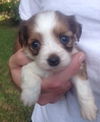 42.6k |
 35k |
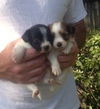 29.6k |
 34.5k |
 9.9k |
 36.6k |
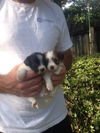 42.4k |
 112.2k |
Copyright © Pet Rescue by Judy
